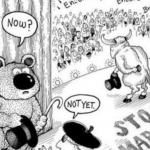We’ve already established that the U.S. carries a substantial financial and economic risk because so many of its banks are “too big to fail” (see “The Stock Market, SNL, and Washington D.C.”). Since the repeal of Glass-Steagall in 1999, the rise of “one stop” financial providers[1], and the “mega bank” consolidation hastened by the financial crisis of 2007-09, the U.S. financial market has become dominated by a handful of heavy weight banks.
Even more striking is the emergence of two particular banks that have emerged as especially overwhelming in size:
JP Morgan Chase and Bank of America split almost half of the total assets held by the six biggest U.S. banks. Such market dominance within a national resource as central and essential as banking is problematic and ill-advised on its own merits. However, combined with numerous stories regarding management lapses on the part of each of the biggest banks – with the latest (but surely not the last) ensnaring the normally well-regarded management of JP Morgan Chase in a multi-billion dollar lapse in proper risk management (“the London Whale” trading scandal) – the risk posed to the financial security of the United States in the years ahead may be far too high to ignore.
Given these basic premises, the essential question facing the United States is whether the President, the Congress, U.S. bank regulators, and/or international bank regulators (through the Basel Committee on Banking Supervision) have the expertise, the will, and the power to actually follow through with effective, functional legislation or bank regulation reform? Such legislation or bank reform would need to either successfully downsize the current mega banks or (alternatively) significantly increase the financial reserves of such banks in ways that will reduce the future risk of a financial crisis as mammoth and destructive as the 2007-2009 crisis.
My response to the question above is as follows. In my opinion, during the four and one-half years since Lehman Brothers collapsed, the only accomplishment that regulators and politicians have to their credit regarding mitigating systemic bank risk is mastering the art of “talking a great game”. In the immediate aftermath of the crisis, regulators resolved to set rigorous bank capital standards that would ensure that the world’s biggest banks would become so solid and financially well-reserved that they could survive virtually any foreseeable stretch of financial stress and economic challenge that might lie ahead. However, after applying an initial round of so-called “stress tests” on banks around the world, the regulators realized how much more vulnerable than expected a large number of banks were, and how difficult agreeing upon and enforcing effective, plausible risk and capital standards would be. The simple fact is that, ever since their post-crisis work began, the one trend that has been consistent in the quality of their regulatory standard setting can best be expressed through the term “backpedalling”.
The politicians, for their part, never forsake the opportunity to forge a new, appealing sound bite that will capture the attention (and support) of voters. Aware that recent Harris Reputational Poll results rank U.S. financial firms among the firms with the very lowest reputation (the 2012 results reported that six of the bottom nine reputation poll spots were held by banks!), bankers and banks are frequently the target of political invective. For example, in January of 2010, President Obama declared, with apparently firm resolve, the need “to prevent the further consolidation of our financial system”. However, statistics show that JP Morgan Chase (for example) is fifteen percent bigger now than it was when the primary new tool of bank regulation (the Dodd Frank Wall Street Reform Act) was passed.
Political rhetoric aside, few industries can match the financial and political clout of banks and financial corporations. Reports from countless sources reflect the awesome (or awful) amounts expended by the industry to curry favor or transform government policy. One revealing report shows that the total spent through direct political contributions and/or lobbyist activities between 1998 and 2008 was a staggering $5.2 billion! [http://wallstreetwatch.org/reports/part2.pdf] As I worked my way through the history of bank regulatory activities since 2006, I repeatedly read accounts of well-intentioned efforts to reform bank capital parameters/regulations that were ultimately thwarted by “bank lobbying efforts”. The existential reality is that politicians need money to ensure longevity, central banks need the cooperation of bankers (to intermediate monetary policy and help distribute and multiply money supply throughout the economy), and politicians/finance ministers wield great influence over regulators.
So what are the chances that effective bank reform will actually become a reality within the U.S.? At best, I have to say that it will be “an uphill climb”. In fact, it will be a steep uphill climb. Why do I believe this? Let me offer just two simple recent examples.
We have previously mentioned the outsized influence over governmental policy-making wielded worldwide by Goldman Sachs. Two recent U.S. Treasury Secretaries were the CEO at Goldman (Robert Rubin and Henry Paulson); Jon Corzine (another former Goldman CEO) served as a Senator for, and then Governor of, New Jersey before taking over M.F. Global and driving it into (and beyond) bankruptcy – mysteriously “losing” $1.2 billion of investor assets in the process (amazingly, he has still not been jailed or even charged with a crime!). And Mario Draghi (current head of the European Central Bank) was a vice chair and managing director at Goldman, while soon to be chief of the Bank of England, Mark Carney, was professionally groomed in finance at Goldman.
Combine that “pedigree” with untold millions in political campaign funding, and there is more than sufficient compelling evidence of excessive political clout. In that spirit, and on behalf of the well-known shareholder activist investment company, Harrington Investments, president John Harrington presented a unique shareholder proposal for review and action at the most recent Goldman Sachs annual meeting. In Harrington’s opinion, Goldman’s massive political contributions (almost $6.5 million in 2012) and lobbying efforts actually do harm to Goldman’s already sullied public reputation. Therefore, as a more transparent and democratic alternative, Harrington’s proposal called for Goldman to explore the option of actually running for office itself—on the basis of the 2010 Supreme Court ruling that corporations have political rights similar to individuals. In Harrington’s words: “It would be less damaging to the integrity of our political system and our company for our corporation to directly run for office as a person under federal or state law, than to continue in the current form of political participation.”
What was the response of Goldman shareholders to this formally submitted shareholder proposal? We will never find out because, through its outsized governmental connections and lobbying acumen, Goldman persuaded the Securities and Exchange Commission to rule that Goldman could exclude that publicly embarrassing proposal from the annual meeting. Perhaps that single action was as powerful statement of the “banking problem” as the Harrington proposal itself!
That Harrington/Goldman story illustrates how insular and parochial bank leaders can be with regard to financial matters. With the frequent (and continuous) flow of financial leaders between bank executive positions and government leadership posts (then back to bank positions) there must always be a question regarding the genuine objectivity of financial policy setters and regulatory enforcers. In fact, in the real world within which we live, I doubt that such objectivity is even possible.
A simple case in point is provided through an opinion offered by outgoing Treasury Secretary Timothy Geithner during a media exit interview. Reflecting upon his term in that key Cabinet post, Geithner commented upon why he feels “uncomfortable” with accusations that bankers have not been punished enough for the financial crisis. To that point, he said: “A huge part of what happened across the system was just a mixture of ignorance and greed, or hope over experience, and not illegal. Most financial crises are not caused by fraud or abuse!”
When I read those words, I literally jumped out of my chair and screamed. How could we have entrusted the position of Treasury Secretary to a man who apparently hasn’t been living in the same world in which you and I have lived for the past four and one-half years?! Hasn’t Geithner been reading the financial news? Did he miss the historical note that all of the record-high (legally declared) bank penalties have been assessed during the past ten years, with most of them occurring since the onset of the mortgage crisis?!
For example, Goldman Sachs was fined $550 million in 2010 for defrauding investors in a mortgage backed security fund. Goldman allowed the manager to select the securities he thought would fail and then package them into the fund to be sold to customers!! Geithner must have missed that memo.
J.P. Morgan Chase and Credit Suisse were fined $417 million in 2012 for packaging and selling troubled mortgages to investors. UBS was fined $1.5 billion in 2012 for its involvement in helping to manipulate the international interest rate benchmark referred to popularly as “LIBOR”… a practice about which Geithner was at least peripherally aware during his term as President of the New York Fed (but then failed to push for any deeper investigation). And the biggest fine yet came earlier this year, when Bank of America and nine other banks were fined a whopping $20 billion for making bad mortgages and then selling them to the government – resulting in taxpayers holding the responsibility for paying off the sky high mountain of defaults that ensued from gross bank negligence. (Now that was an honest to goodness “Fiscal Cliff” with which we are still reckoning!)
How Geithner could have missed all of these “memos” is beyond me. Each of them offers clear and compelling evidence of each of the charges for which Geithner now asserts banks have not been guilty!
But then that is the point, isn’t it! Geithner, whose cronies and colleagues are bankers, is practically incapable, personally or professionally, to “see straight” when it comes to the miscues, mistakes, and acts of outright misconduct within the banking world. Because so many individuals who are central within the process of bank policy-making and regulatory oversight (both in the U.S. and around the world) also suffer (to one extent or another) from the symptoms exhibited by Tim Geithner, the efforts of earnest leaders (such as Representative Sherman and Senators Sanders, Brown, and Vitter) to reign in the national financial risk inherent within mega-banks will have to somehow overcome, not just a “hill” of resistance, but a massive “mountain” of opposition!
[1] Sandy Weil’s combination of Citibank with Traveler’s Insurance was the pioneer; he later added Smith Barney.
Submitted by Thomas Petty
Related Posts
Also on Market Tamer…
Follow Us on Facebook

 You Don't Need Talent to Succeed: Lessons From Warren Buffett's Lifetime of Investing
You Don't Need Talent to Succeed: Lessons From Warren Buffett's Lifetime of Investing



